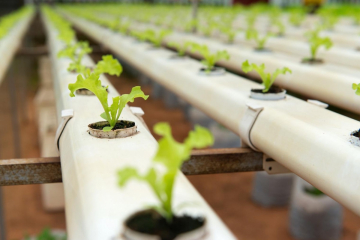The food and beverage industry is facing major change and shifting expectations, and brands have to decide whether to adapt, or risk losing out.
This year’s Inogen WorldView event in NYC offered attendees a timely, big picture view of macro-trends the food & beverage industry is facing. Our four industry-leading speakers, whose presentations are linked below, offered up a comprehensive overview of the current landscape:
- First up, Stephen Rannekliev, Director of Food and Agribusiness at Rabobank, offered a high-level look at the macro-trends Rabobank sees impacting the industry in the future, as well as the disrupters they foresee having the most impact.
-
Listen to Stephen's presentation here, and follow along here, and check out his guest blog on the future of the food and beverage industry.
-
- Next, Louisa Burwood-Taylor, Editor of Agfunder News, examined the impact of technology on the industry, highlighting some of the fascinating new tech currently being developed and piloted.
-
Listen to Louisa's presentation here, and follow along here, and don't miss her guest blog on technologies that have the power to disrupt the agriculture industry status quo.
-
- Then Amy Braun, Sustainability Director for Kellogg Company, offered a look at how her organization is approaching the disruptions and challenges the industry is facing, highlighting specific initiatives that have found success.
-
Listen to Amy's presentation here, and follow along here, then be sure to read her guest blog, focused on how specifically Kellogg is dealing with industry disruption.
-
- And finally Tensie Whelan, Director of the Center for Sustainable Business at NYU Stern School of Business, discussed how future business leaders are being prepared to deal with these issues, and more.
-
Listen to her presentation here, and follow along here, then read more about the expectations of rising sustainability leaders and consumers in her guest blog.
-
But what do we do with this information, and how do organizations embrace change and innovation rather than being left behind? Let’s break it down:
Understand the Playing Field
Our environmental consulting experts agree that the forces with the greatest potential impact on the food and beverage industry are changing consumer and stakeholder behaviors and with these come increased business risk throughout the value chain. Organizations today must operate under greatly increased consumer expectations and radical transparency—customers demand information but also require organizations to meet their expectations regarding ethical, social, and environmental standards, as well as their nutritional preferences.
Companies must not only provide visibility into these issues, which directly impact buyer purchasing decisions but must also be walking the walk. In a post-greenwashing world, authenticity is key, but not always easy. However, brands with purpose who are able to successfully communicate that purpose to their consumers are proving the victors in an increasingly competitive market.
At the same time, climate change, population growth, and various social factors are putting all facets of the supply chain at higher risk. Companies need to understand and balance concerns around resource conservation and availability with savvy regarding the political and social change in the areas where they operate, all while keeping an eye on worker safety and regulatory compliance across global operations. These concerns become inextricably linked to consumer expectations and accountability in this age where social media can magnify any misstep in an instant, and where a business’s social license to operate is dependent on being perceived as a good steward and corporate citizen.
EHS & Sustainability…and Beyond
In light of these changes, companies are facing more and different risks than they have in the past, escalating EHS&S costs, and the reality that corporate responsibility has become an integral part to creating business resiliency and strength of the brand, whether they like it or not. For more mature organizations, this manifests as more integrated and decentralized EHS management—like the quality before it, sustainability is becoming the norm that companies must address in order to remain competitive. It must become a core elemental consideration of management systems at all levels. This change also requires having a sustainability strategy that is coherent and measurable, but, more importantly, that can be clearly communicated both internally and externally (see: increased consumer expectations.)
All of this points toward a more holistic approach to EHS&S, with organizations taking into account their particular geographies, targeted consumers, and circumstances, as well as their budget and limitations. Companies will need to make the greatest impact with what they have, which will require big-picture thinking, rigorous prioritization, and strong communication. Top leadership approval and support will be key, and necessary for attracting and retaining top talent, even in roles that don’t directly touch EHS and sustainability.
Don’t Fight the Future, Forge the Future
Organizations who truly integrate sustainability into their core business principles and who are open to innovation and collaboration are the ones who will find success in this new world order--sustainability can no longer be sidelined but must be intrinsic to the organization. Only by staying future-and customer-focused can companies truly understand their full scope of risk and see their opportunities.
Investing in and proactively adopting new technologies and processes is one for businesses to ensure they have a place in the future and won’t be left behind by those more willing and able to adapt. This includes things like automation, with its associated cost savings and efficiencies, and utilizing big data for better insights, which lead to better decisions. Organizations need to encourage new ideas from within and put the muscle into fostering innovation and chance.
By being open to new partnerships that may have been unheard of under the old system (perhaps with competitors or government organizations), companies can avoid “reinventing the wheel”. This could include working towards harmonized standards across industries, and towards reliable benchmarking to help everyone speak the same language. This need to be communicators and connectors can seem outside the experience of organizations that are traditionally unfamiliar with this type of work, so companies will need to focus on building organizational capacity and hiring for these skills in new employees.
The future is coming, whether we like it or not, but along with the changes and challenges it brings are a wealth of opportunities and advantages available to those who with the foresight and courage to act.
Ready for more? Check out our new ebook, compiling insights from all four WorldView speakers, here.
Want more news and insights like this?
Sign up for our monthly e-newsletter, The New Leaf. Our goal is to keep you updated, educated and even a bit entertained as it relates to all things EHS and sustainability.
Get e-NewsletterHave any questions?
Contact us to discuss your environment, health, safety and sustainability needs today.





